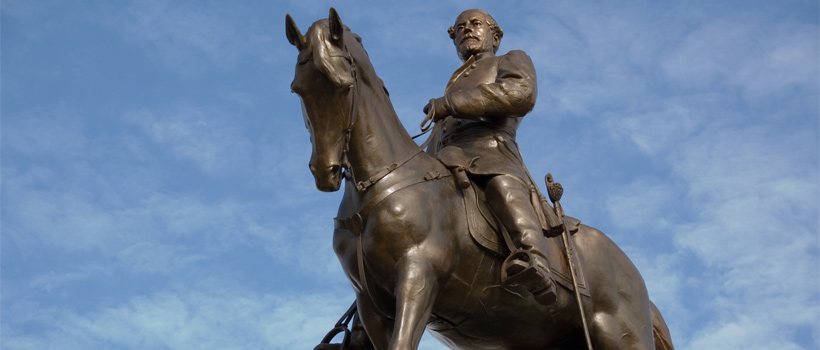The Ethics of Public Memory

The Confederate flag over the State House in South Carolina, the statue of Robert E. Lee in Charlottesville, and the carving of Confederate leaders at Stone Mountain in Georgia all testify to the contentious and sometimes deadly force public memorials can have.
What do we do with public memorials to bad causes? With statues commemorating those who defended abhorrent ideas? Is removal always the best answer? Does it carry any risks? What are the risks of leaving them in place? What do we lose when we expunge disturbing and offensive monuments from public space? Can the context in which such monuments are viewed and experienced be changed? And how are we to think of what is not memorialized? What are the ethics and politics of absent monuments?
The Applied Ethics Center's Ethics of Public Memory project takes up these and related questions.
The Ethics of Public Memory project has been supported by the Massachusetts Humanities Foundation, Beyond Conflict, the Faculty Staff Union at UMass Boston and the Provost's Office at UMass Boston.
White Papers & Projects
White Papers
The Applied Ethics Center is collaborating with the NGO Beyond Conflict on a new initiative to examine contested histories in the US and abroad.
The Contested Histories Initiative (CHI) is a global effort to examine the issues surrounding statues, street names, and other historical legacies in public spaces with an aim to identify principles, processes, and best practices for decision-makers, civil society advocates, and educators confronting the complexities of divisive historical memory.
As part of this initiative, the Applied Ethics Center has produced a white paper to help policymakers and community members think through debates about controversial monuments and commemorations.
The paper answers some of the following questions: What is a monument? Why do monuments matter? What are some of the arguments against removing problematic monuments and do they hold up to scrutiny? What kind of strategies are available for dealing with problematic monuments beyond removal?
You can find more details about the Contested Histories initiative and download the paper here.
High Scool Syllabus
As part of this project, we developed a high school curriculum focused on the monuments debate. That curriculum was delivered at the Cambridge Rindge and Latin High School in Cambridge, MA. Find that document here: Ethics of Public Memory - High School Syllabus.
We have recently written a white paper to advise policymakers and community members on how to deal with controversial monuments. At present, we are working on a project examining the legacy and memorialization of African-American poet Phillis Wheatley.
Research & Symposia
- The Applied Ethics Center's Nir Esikovits and Dana Miranda recently guest-edited a special section of the Journal of Global Ethics on the monuments debate. Those papers can be found here.
Public Lectures
Contact Us
Applied Ethics Center
100 Morrissey Blvd.
Boston, MA 02125
617.287.6545